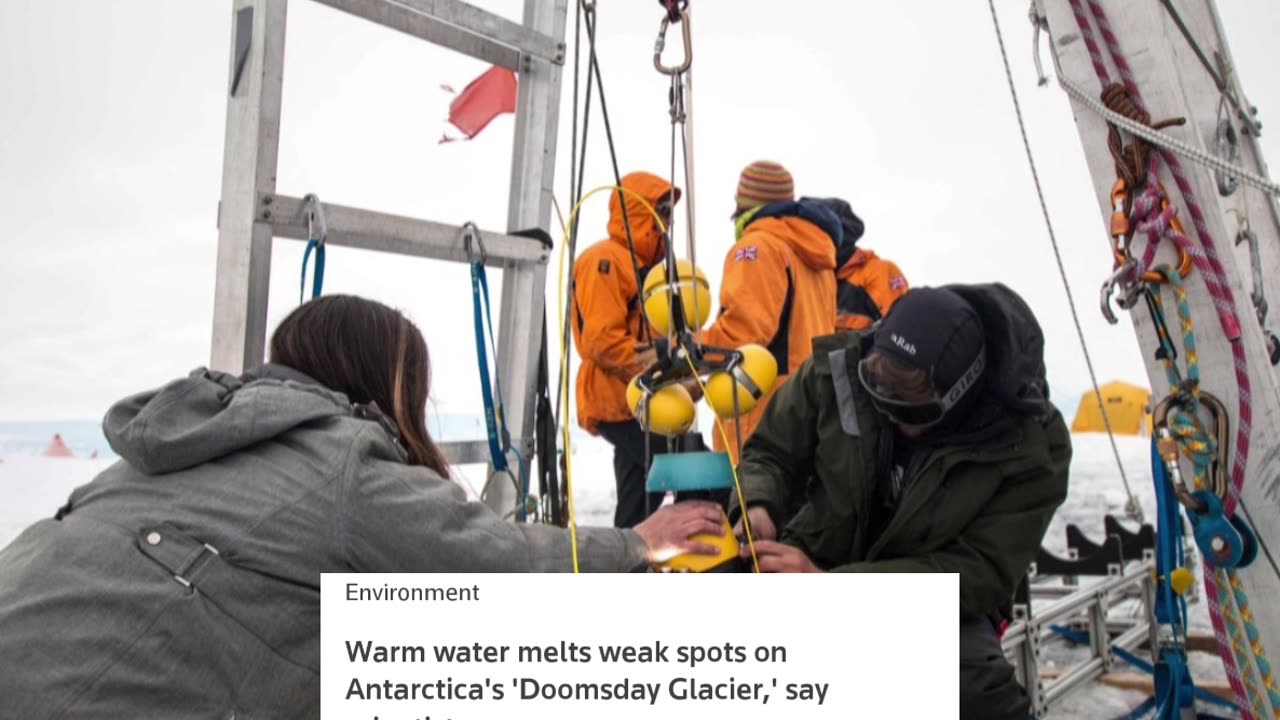Premium Only Content

Warm water melts weak spots on Antarctica's 'Doomsday Glacier,' say scientists
Warm water melts weak spots on
Antarctica's 'Doomsday Glacier,' say
scientists
Scientists studying Antarctica's vast Thwaites Glacier - nicknamed the Doomsday Glacier - say warm water is seeping into its weak spots, worsening melting caused by rising temperatures, two papers published in Nature journal showed on Wednesday.
Thwaites, which is roughly the size of Florida, represents more than half a meter (1.6 feet) of global sea level rise potential, and could destabilize neighboring glaciers that have the potential to cause a further three-meter (9.8-foot) rise.As part of the International Thwaites Glacier collaboration - the biggest field campaign ever attempted in Antarctica - a team of 13 U.S. and British scientists spent about six weeks on the glacier in late 2019 and early 2020.
Using an underwater robot vehicle known as Icefin, mooring data and sensors, they monitored the glacier's grounding line, where ice slides off the glacier and meets the ocean for the first time.In one of the papers, led by Cornell University-based scientist Britney Schmidt, researchers found that warmer water was making its way into crevasses and other openings known as terraces, causing sideways melt of 30 meters (98 feet) or more per year.
"Warm water is getting into the weakest parts of the glacier and making it worse," Schmidt told Reuters.
"That is the kind of thing we should all be very concerned about," she said about the findings which underscored how climate change is reaching isolated Antarctica.
The other paper's findings, which Schmidt also worked on, showed about five meters (16 feet) per year of melt near the glacier's grounding line - less than what the most aggressive thinning models previously predicted.
But she said the melting was still of grave concern.
"If we observe less melting... that doesn't change the fact that it's retreating," Schmidt said.
Scientists have previously depended on satellite images to show the behavior of the ice, making it difficult to get granular details. The papers represent the first time a team has been to the grounding line of a major glacier, providing a look right where "the action begins," Schmidt said.
The findings will help in the development of climate change models, said Paul Cutler, program director of Antarctic Sciences at the National Science Foundation. He reviewed the papers, but was not involved in the research.
"These things can now be taken on board in the models that will predict the future behavior, and that was exactly the goal of this work," he said.
(This story has been refiled to change 'censors' to 'sensors' in paragraph 4)
-
 LIVE
LIVE
SpartakusLIVE
5 hours agoNONSTOP Snipes, Rockets, and BICEPS = Monday MOTIVATION
440 watching -
 LIVE
LIVE
Rallied
6 hours ago $1.96 earnedSolo Challenges All Day
293 watching -
 DVR
DVR
Flyover Conservatives
9 hours agoIs AI Actually Alien Intelligence? Dr. Jason Dean Exposes the Dark Side | FOC Show
10.3K -
 1:47:36
1:47:36
Glenn Greenwald
5 hours agoJD Vance and Rand Paul Clash on Due Process: War on Terror Echoes; Has the U.S. Given Up on Confronting China? Ben Shapiro's Latest Falsehoods About Israel | SYSTEM UPDATE #510
83K65 -
 LIVE
LIVE
RaikenNight
3 hours ago $0.14 earnedExploring the Galaxy of No Mans Sky
143 watching -
 LIVE
LIVE
Spartan
5 hours agoRanked and Expedition 33 (NG+4 and all enemies Set to 10x health)
63 watching -
 LIVE
LIVE
Jokeuhl Gaming and Chat
8 hours agoDARKTIDE - Warhammer 40k w/ Nubes and AoA
90 watching -
 2:19:56
2:19:56
Nerdrotic
15 hours ago $3.03 earnedNerdrotic Nooner 513
40.1K2 -

BigTallRedneck
4 hours agoRANKED FINALS W OMEGA
12.3K -
 LIVE
LIVE
Eternal_Spartan
11 hours ago🟢 Eternal Spartan Plays Final Fantasy 7 Rebirth Ep. 3 | USMC Vet | Join the Best Chat on Rumble
69 watching